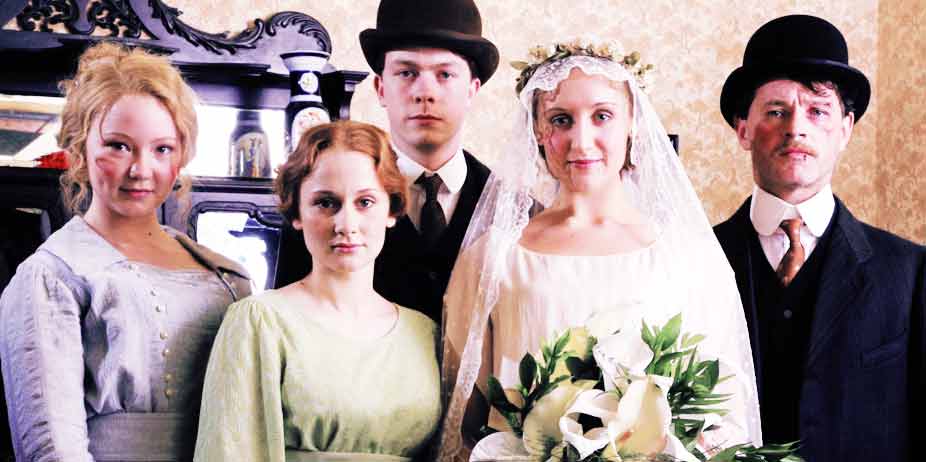 Lilies (2007)
Lilies (2007)
For whatever reason, I had heard of this production but did not bother to watch it until I ran across it one afternoon on Netflix. It follows the lives of three sisters in the early nineteen hundreds as they experience the pains and triumphs of love, and struggle to find their way in a changing world, but while its characters are memorable, sometimes the raw grittiness got to me.
Several years after the death of his wife, Dada Moss (Brian McCardie) still struggles to overcome the loss, but is blessed with three fiery girls: the gentle-hearted, reliable Iris (Catherine Tyldesley) who makes her living making and boxing up ladies' chocolates, the hot-tempered and ambitious May (Leanne Rowe) who dreams of becoming "a film star," and the level-headed, somewhat blunt but purpose-driven Ruby (Kerrie Hayes), who has decided to sell corsets for a living. She wastes no time in selling all her neighbors the merits of these new stays, while May serves at the household of the wealthy Brazendales, and Iris tries to keep their father's furious temper under check.
Their brother Billy (Daniel Rigby) is back from the war with PTSD and terrible nightmares. He refuses to set foot on board another ship, which means their income is limited. But as he faces his fears -- and a man from his past -- the sisters forge through their own challenges: Iris falls in love with a charming local magician who steals her heart, May becomes romantically entangled with her employer's husband, and Ruby tries out "modern ideas" with a group who may not have her best interests in mind.
Everything about this series is top drawer, from the writing to the characterization to the costumes. The BBC is no slouch when it comes to quality entertainment. I just wish it had been a little less... dark. The implied animal violence bothered me a lot, as did the unnecessary occasional nudity, and I felt nothing but total hatred for their self-serving, self-absorbed, emotionally stinted father, particularly in the episode where he takes his belt to all of them. By that point, there was nothing in me that wanted to see him "reunited" with his family, so his eventual restoration to the household sickened me (he's not going to change; so instead of a happy ending, these girls have a violent, abusive man back in their life). It may be realistic, but it's not that fun to watch, especially when a recent episode before the event tried to spark my sympathy in him losing a new potential wife because of his daughter's objections to replacing their mother (she may have had her heart broken, but she's better off without someone who might beat her if he gets mad).
However, and this is a major point in its favor, the series has one of the best, most optimistic, fair-minded representations of a man of the Church that I have seen in a long time. Father Melia (Scot Williams) is a gentle, generous, good-natured, compassionate, honestly good man, always there with a compassionate word or shared truth. He swiftly became my favorite character and never once fell from grace. I'm so used to Catholic priests being predatory, condescending, or hypocritically pious that it struck me as strangely wonderful until I found out Heidi Thomas, authoress of the extremely popular, compassionate-to-faith Call the Midwife, was involved. The acting is also absolutely stupendous. The characters make mistakes, and run a gamut of emotion, and I was engaged every step of the way. There are a lot of interesting twists and a few unexpected turns, but since a lot of the domestic violence turned my stomach, I doubt I will ever watch it a second time.
Sexual Content:
One graphic sexual encounter (movement, sounds); one implied
homosexual sexual encounter (with backside nudity, kissing, a morning after
scene); references to a previous homosexual encounter; two instances of male
backside nudity; a child out of wedlock. A woman performs a saucy burlesque
performance in a corset and bloomers. References to an adulterous affair / a man
seducing a girl because his wife wants a child. Much is made over a man not
being 'whole down there' after a war, and being unable to consummate his
marriage.
Language:
Occasional profanities. A half dozen uses of "Christ!"
Violence:
Animal-related violence: a rabbit and snake are beheaded in
separate episodes (below screen; the bunny spatters blood on bystanders). In the
same bunny episode, a man buys and then slits their throats (off camera, the
dead bunnies are shown in a box) and a man kills a rooster in a fit of rage,
then skins and tries to sell it. We see a dog covered in blood after he was hit
by a car. Human-related violence: a man engages in a fight for money, and has
frequent violent tantrums. In one hard-to-watch scene, he takes off his belt and
beats his daughters ruthlessly with it, while calling one of them a "whore."
Four suicide attempts/considerations (a man gasses himself in an oven; a man
begs another man to let him drown in the ocean; a woman considers throwing
herself and her baby into the river; a woman slits both her wrists). Blood
covers the floor / a woman's dress after she loses a baby. An extremely long,
difficult birthing scene.
Other:
A woman tries to induce an abortion by drinking something
she shouldn't. Various points of view are expressed by 'upper society' and
'lower street' individuals that scorn the Catholicism the girls practice; a man
attends a séance where a woman communicates with his dead wife. A woman argues
that a woman should have the right to abort her child and "have control over her
own body."
